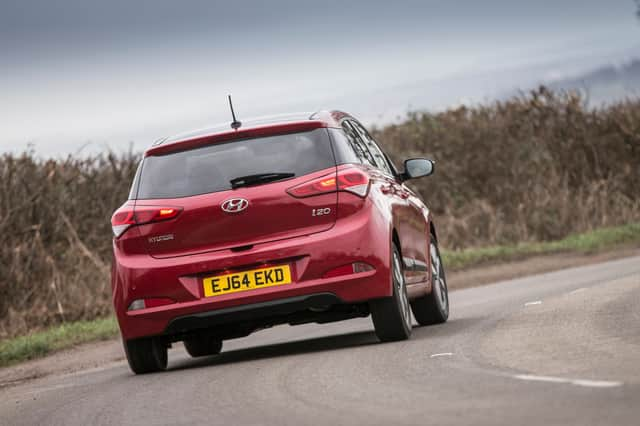Hyundai hatches new i20


Hyundai i20 1.4 SE
Engine: 1,368cc, four-cylinder, petrol
Power: 99bhp and 99lb.ft. of torque
Performance: 0-62mph in 11.6 seconds and 114mph
Economy: 51.4 mpg (combined)
CO2 emissions: 127g/km
Price: £13,820
I remember former British/Canadian heavyweight champion Lennox Lewis having his credentials questioned after campaigning at a time when he claimed his crown at a time when there were few contenders at the top of their game left to fight.
The same cannot be said of the fight that car manufacturers are having in the big-stakes world of the B-segment hatchback.
Advertisement
Hide AdAdvertisement
Hide AdThere can be no pulling of punches when the list of possible title contenders includes so many quality contenders. The Ford Fiesta, Vauxhall Corsa, Volkswagen Polo and Mazda2 can all stake a claim to a slice of buyers affections.
Hyundai has now upped its game with its latest i20 and so there could now be a fifth, having scooped a string of design awards following its launch less than three months ago.
The stakes are high. The i20 has landed just over 150,000 sales in the UK since its launch in 2002. Ford’s Fiesta managed over 130,000 registrations last year alone.
Prices start at £10,695 for the 1.2 S and top out with the £17,400 1.4 CRDi Premium SE Nav.
Advertisement
Hide AdAdvertisement
Hide AdA choice of three petrol (two 1.2 and a 1.4) and two diesel engines (1.1-litre and 1.4) along with no fewer than eight possible specifications (S, S Air, S Blue, SE, Premium, Premium SE, Premium Nav, Premium SE Nav).
Tested here is the SE 1.4 Manual, which comes in at £13,820 with the addition of metallic paint (£495).
Among the standard kit on all i20’s are tinted windows, remote central locking and electric front windows.
By the time you reach the mid-range SE spec, 16 inch alloys, daytime running lights, air conditioning, Bluetooth phone connectivity, cruise control, rear parking sensors and an automatic hill hold brake have been added into the mix, along with a Lane Departure Warning system.
Advertisement
Hide AdAdvertisement
Hide AdThere is a familiar Hyundai/Kia family feel to the interior. Panels of lighter coloured plastic add some variation to what is an an array of fairly tough plastics covering the dash.
The dot matrix display of the stereo system looks a little rudimentary.
But the functionality and build quality is good and it is apparent from the off that Hyundai has worked hard to improve passenger comfort in its latest i20.
Sitting on a new platform, the wheelbase of the new car has been extended by 45mm to liberate what the Korean brand claims is class-leading interior space, along with a 326 litre boot capacity (including the recess beneath a false boot floor).
Advertisement
Hide AdAdvertisement
Hide AdThere is undoubtedly room for five, a boast which few in the class can make.
Perhaps the biggest change over the previous generation i20, however, is the change to the ride.
Where the rear of its predecessor might crash and bump on occasion, the new i20 rides in accomplished fashion.
A side-effect of this more pliant rear end is that the front end feels less alert. A new electric power steering set-up is perhaps the best of Hyundai’s current crop for feel and predictability, but its lack of aggression does little to sell the i20 as a sporty hatchback — areas where the Ford Fiesta and Mazda2 hit the mark.
Advertisement
Hide AdAdvertisement
Hide AdHyundai’s range-topping 1.4-litre petrol engine, meanwhile, is currently the most powerful in the range, but a claimed 11.6 second dash to 62mph and 114mph top speed are unlikely to capture younger drivers’ imaginations.
Without a start/stop system installed, the i20 also records fairly conservative 51.4mpg and 127g/km CO2 emissions, which is some way behind its rivals.
An all-new turbocharged one-litre T-GDi engine — delivering almost 120bhp — is expected to deliver Ford EcoBoost-baiting performance and economy stats later in the year, however.
What the 1.4-litre unit does deliver is smooth and fairly refined performance and at no time does it feel truly lacking in pace, although it has little enthusiasm for revving beyond around 4,000rpm.
Advertisement
Hide AdAdvertisement
Hide AdThe i20’s interior refinement is actually one of its major plus points — even wind noise is fairly minimal at motorway speeds — which is another major boon for passengers already enjoying the decent leg room and comfortable ride.
Class-leading interior space, award-winning styling and a impressive refinement are top of the new i20’s remit.
Where it fails to score points is the area where its competent dynamics fail to develop into something more entertaining when the pace rises, like that of the multi-talented Fiesta and Mazda2. There’s also a slight lack of tactility within its cabin and, with this 1.4 engine, it’s not the best in performance or eco terms.
For those wanting to down-size, or simply wanting their small hatchback to fulfil family as well as commuter duties, the i20 is a great option, though.
At a time when competition has never been tougher, it still looks like a pretty good buy.